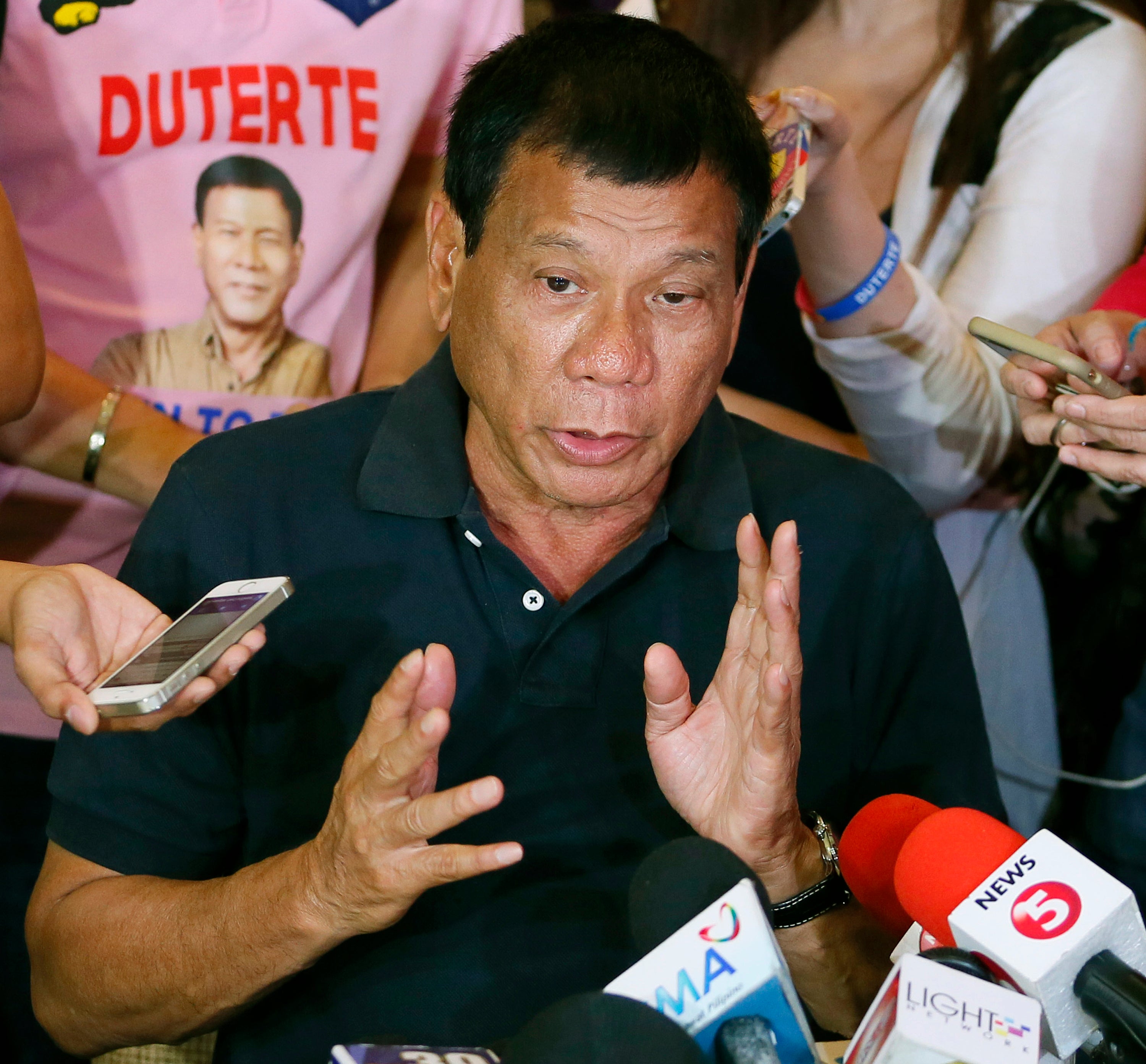Philippines' Duterte will 'die first' before facing ICC
Philippine President Rodrigo Duterte’s top legal adviser has lashed out at the International Criminal Court’s decision to investigate allegations of crimes against humanity during his bloody war on drugs, accusing the body of being used as a pawn by the popular leader’s political opponents as an election nears

Your support helps us to tell the story
From reproductive rights to climate change to Big Tech, The Independent is on the ground when the story is developing. Whether it's investigating the financials of Elon Musk's pro-Trump PAC or producing our latest documentary, 'The A Word', which shines a light on the American women fighting for reproductive rights, we know how important it is to parse out the facts from the messaging.
At such a critical moment in US history, we need reporters on the ground. Your donation allows us to keep sending journalists to speak to both sides of the story.
The Independent is trusted by Americans across the entire political spectrum. And unlike many other quality news outlets, we choose not to lock Americans out of our reporting and analysis with paywalls. We believe quality journalism should be available to everyone, paid for by those who can afford it.
Your support makes all the difference.Philippine President Rodrigo Duterte's top legal adviser lashed out Thursday at the International Criminal Court s decision to investigate allegations of crimes against humanity during his bloody war on drugs, accusing the court of being used as a pawn by the popular leader's political opponents.
Chief presidential legal counsel Salvador Panelo alleged that The Hague Netherlands-based international court was “being utilized as a political and propaganda apparatus by those usual suspects who will do anything to dethrone the president from his seat.”
“While we expect that more theatrics will be employed by the detractors of the president as election season draws near, this blatant and brazen interference and assault on our sovereignty as an independent country by the ICC is condemnable,” he said in a written statement.
The court on Wednesday said it had authorized an investigation requested by former prosecutor Fatou Bensouda into Duterte's anti-drugs campaign, saying it could not "be seen as a legitimate law enforcement operation.”
More than 6,000 mostly poor drug suspects have been killed during the campaign, according to the government, but human rights groups say the death toll is considerably higher and should include many unsolved killings by motorcycle-riding gunmen who may have been deployed by police.
Duterte, who has cheered many of the deaths but denied condoning extrajudicial killings of drug suspects, is constitutionally prohibited from running for another term as president in elections next year. But he has announced he will run as vice president instead in a maneuver critics have said is an attempt to both maintain power and insulate himself from the ICC investigation, which has been expected.
In her 57-page request, a partially redacted version of which the court released to the public, Bensouda argued that Duterte's aggressive approach and bellicose rhetoric toward drug traffickers had already taken shape when he served as mayor of Davao City, before he was elected president in 2016.
“Throughout his tenure as mayor, a central force of his efforts was fighting crime and drug use, earning him the nicknames ‘The Punisher’ and ‘Duterte Harry’ for the violent manner in which he sought to combat crime," Bensouda wrote.
“On multiple occasions, Duterte publicly supported and encouraged the killing of petty criminals and drug dealers in Davao City.”
She dismissed the contention by Philippine authorities that deaths in the war on drugs resulted from police acting in self defense, noting that “statements by some public officials suggest that they considered the killings an achievement and an integral component” of the campaign, and that they were encouraged by Duterte as president.
“Duterte praised the increasing number of police killings as proof of the “success” of his “war on drugs,” she argued. “Duterte also made a number of public statements encouraging members of security forces to kill drug suspects, regardless of whether they posed an imminent threat, and promising to shield such perpetrators from accountability.”
The investigation will look at killings that took place during some of the time Duterte was mayor, and during his time as president between July 1, 2016 and March 16, 2019, the date the Philippines withdrew from the court.
Panelo, the presidential legal counsel, argued that if the court wanted to investigate it should have done so while the Philippines was a member of the ICC, and that now it has no jurisdiction.
Last year, the court decided not to pursue an investigation into crimes alleged committed by China against Uyghur and other minorities there, saying it did not have jurisdiction over non-members. The United States and Russia are other notable non-members of the ICC.
But Carlos Conde, senior Philippine researcher for Human Rights Watch, said by focusing on the years that the country was still a member of the court, the ICC is well within its rights to investigate Duterte's actions.
“The government’s claim that the ICC does not have jurisdiction or a mandate to investigate the Philippines is just a flat out lie," he told reporters in Manila.
He added that Duterte's run for vice president does “not in any way afford him immunity from suit or investigation by the ICC.”
"He will of course try everything in his power to frustrate the ICC from doing its job and its mandate,” Conde said.
Duterte's spokesman, Harry Roque, said the president was unfazed when he'd informed him late Wednesday of the court's decision to open an investigation.
“The president didn’t have any reaction, because from the get go, he has said that he’ll die first before he faces any international courts,” Roque told reporters.
“If there are any complaints, they should file it here in the Philippines.”
___
Rising reported from Bangkok